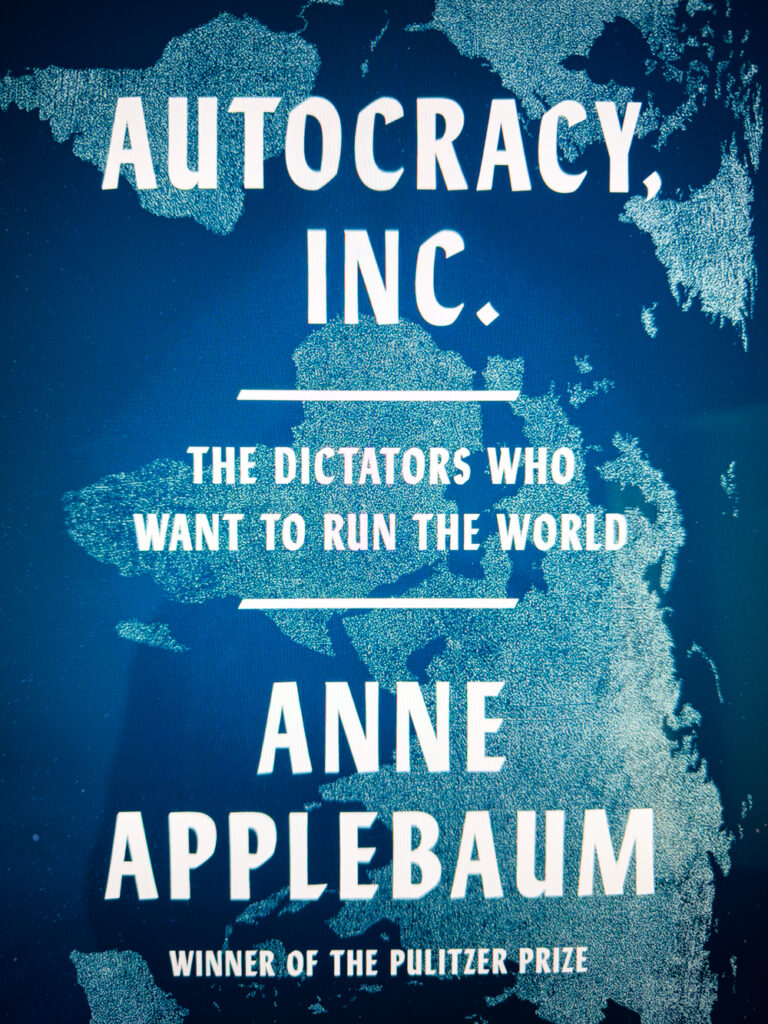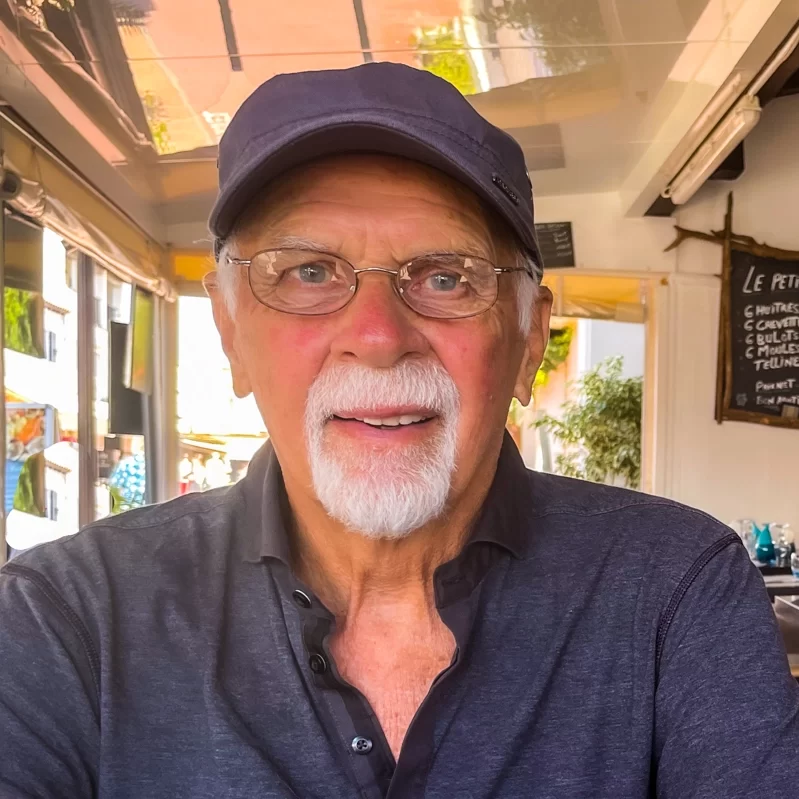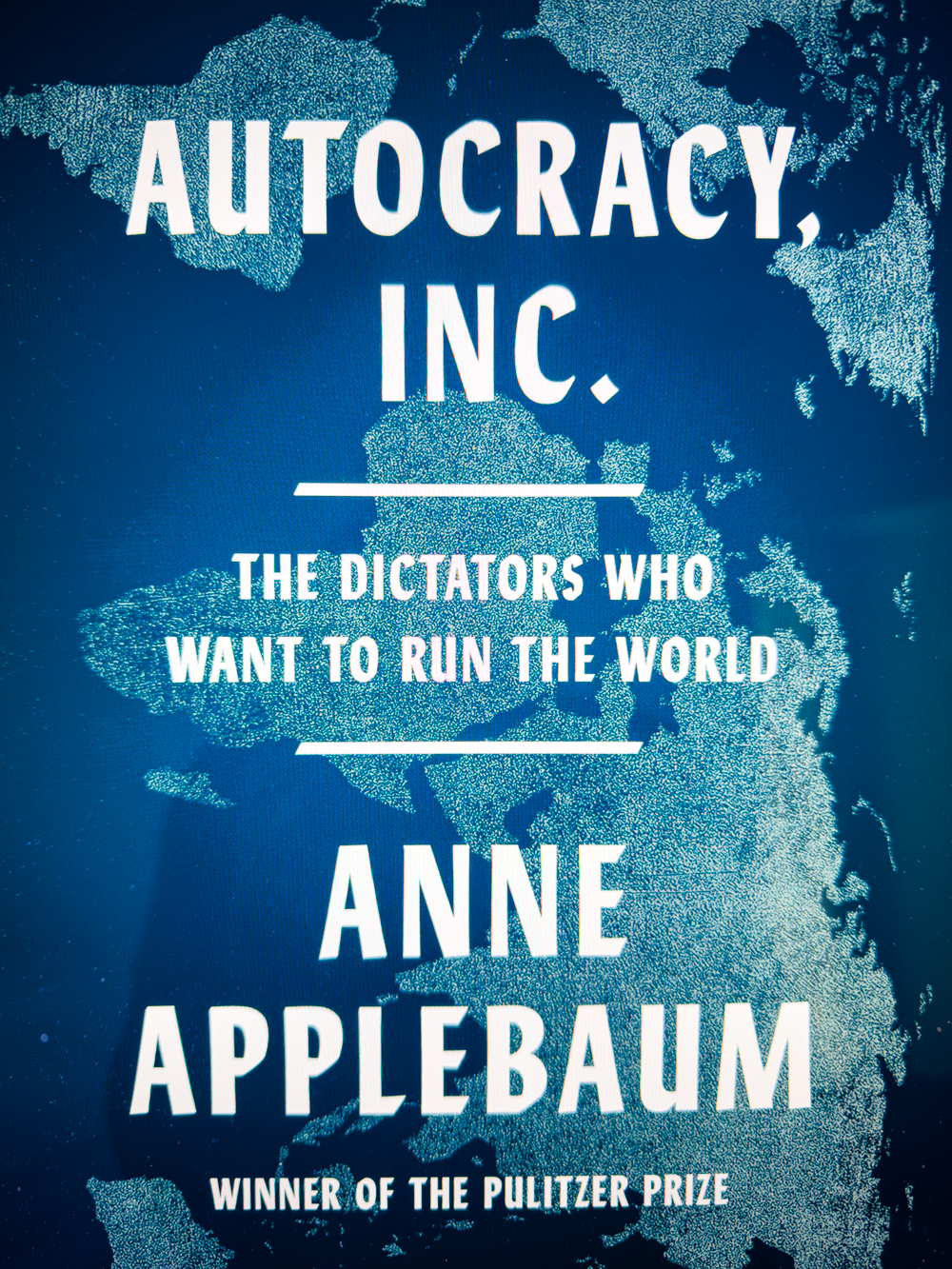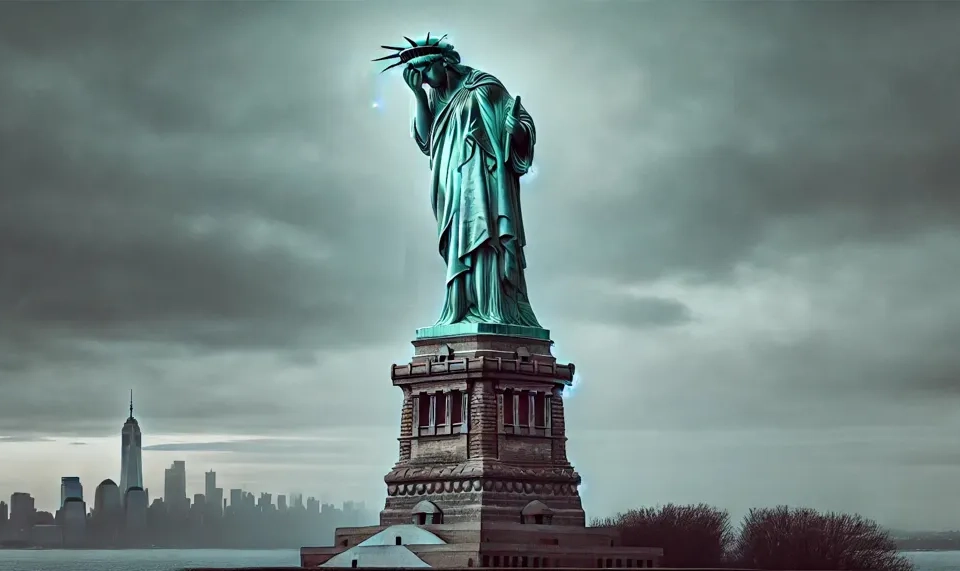Book Vibes > Autocracy, Inc.: The Dictators Who Want to Run the World
A book that shines a light on the lethal trajectory of Donald Trump’s second U.S. presidency (Trump 2.0) is Anne Applebaum’s Autocracy, Inc.
by Anne Applebaum(2024).

Haiti is widely regarded as a failed state. With 200 to 300 active criminal gangs, the nation’s economy, governance, political systems, and public services have all collapsed. In addition to instilling fear in the public, these gangs have also been engaged in conflicts with each other. By 2023, a total of 4,789 murders were recorded that year, the majority resulting from inter-gang violence.
These deadly tribal wars inspired one gang leader, Jimmy “Barbecue” Chérizier, to devise a novel idea. Barbecue decided to negotiate an agreement between the rival factions G9 and G-Pep to cease hostilities and begin cooperating. These discussions between adversaries led to the establishment of Viv Ansanm coalition in 2023 — a coalition of collaborating gangs. Other gang factions joined the coalition, and through their organization, they have significantly enhanced their power to control most aspects of crime committed against Haitian citizens and officials.
Through this experience, Haitian gangs have learned that cooperation among bad actors trumps warfare between bad actors. Cooperatively, they control Haiti more effectively and profitably than warring factions.
On an exponentially larger scale, Anne Applebaum’s 2024 book Autocracy, Inc. illuminates the value of global cooperation among malevolent actors. Her analysis examines international networks of significant bad actors who have realized the importance of collaboration. Autocracy, Inc. delves into the workings of national leaders who ruin their countries through kleptocratic governance.
What is a kleptocrat? Derived from Greek words meaning “rule by thieves,” kleptocracy is a form of government where leaders use their power for personal gain at the expense of those they govern. In short, a kleptocrat is an autocrat who heads a government with corruption in the marrow of its bones.
The most successful kleptocracies are those which, rather than strip the house bare, occupy it and allow other members of the household to generate their own income while paying ‘rent’ to the landlord — the godfather-like head of state.
When democratic institutions are weakened, kleptocrats and their wealthy collaborators become rulers who abuse political power, misuse public funds, and disenfranchise the very public that voted them into office.
Autocracy, Inc.: Roadmap to the United States in 2025
If there is one book that shines a light on the lethal trajectory of Donald Trump’s second U.S. presidency (Trump 2.0), it is Applebaum’s Autocracy, Inc. Published five months before Trump’s reelection, her book details an emerging network of mercenary dictators that Trump appears to aspire to join.
Like Jimmy “Barbecue” Chérizier’s diabolical idea about cooperating gangs, Applebaum tells us that today’s autocrats are not the same as the autocrats of the 20th century. Rather than competing with or operating in isolation, they cooperate and support one another in networks of shared tactics and mutual interests to expand their authoritarian control.
This cooperation does not imply that these self-serving autocrats have affection for one another or share a unified ideology. Their network is founded on a mutual interest in greed, a lack of empathy for the lives they ruin, and a profound, visceral hatred of democracy. These kleptocrats show no interest in coexisting with democratic nations. Instead, they seek to destroy democracy as a liberal form of governance and undermine the countries that uphold liberal values.
“Membership” in this club of autocrats includes countries large and small: Russia, China, India, North Korea, Hungary, Venezuela, Cuba, Syria, Saudi Arabia, Turkey, Belarus, Myanmar, Pakistan, Bangladesh, Nigeria, Uzbekistan, Kazakhstan, Tajikistan, Turkmenistan — to name a few.
Could Donald Trump be vying for membership in this club? Decide for yourself after learning about strategies autocrats use to degrade their countries into kleptocracies.
I will examine three core strategies mercenary autocrats employ to exploit their power and wealth for personal gain:
- Self-enrichment at the public expense.
- The importance of mutual aid networks and resource-sharing.
- The value of exploiting and manipulating citizens for autocratic gain.
Kleptocratic Strategies for Self-Enrichment and Public Impoverishment
Money doesn’t grow on trees. If you want to generate wealth for yourself, you have three options: create and sell valuable products, invest in a third party that sells valuable products, or extract assets from others through force or deceit. Kleptocrats prefer the third option: siphoning wealth from others through coercion or false promises.
A much-favored strategy is stealing a country’s wealth and natural resources. This involves embezzling public funds, seizing lucrative industries, and awarding state contracts to cronies in exchange for kickbacks.
Vladimir Putin, Russia’s president, has created the playbook for self-enrichment. In 1992, as mayor of St. Petersburg, Putin oversaw a raw materials export deal where $100 million worth of goods were exchanged for food that never arrived to benefit his city’s citizens who had insufficient food reserves. Although an investigation didn’t directly link Putin to personal enrichment at the time, it raised questions about his oversight.
The Financial Times recently reported on Putin’s fervor for seizing others’ wealth. Since launching its full-scale war in Ukraine, Russia has intensified a wave of nationalizations, targeting major businesses under the pretext of safeguarding national interests. Domodedovo Airport, Moscow’s second-largest, fell victim to Putin’s need for money to support his aggression against Ukraine.
Domodedovo Airport, owned by billionaire Dmitry Kamenshchik and his investors, was once a dilapidated Soviet airfield. I can attest that it was a dark and foreboding place for travelers because I flew out of that airport a few times in the late 1990s. Through significant investments, Kamenshchik transformed Domodedovo into one of Russia’s largest and most modern airports.
Because Putin’s three-year war with Ukraine has been depleting Russia’s finances, Putin’s prosecutor-general has opened cases against more than 85 Russian businesses, accusing these business owners of crimes against the state. The prosecutor-general claims it has already returned $27.9bn to the state through this take-over process.
In the case of billionaire Dmitry Kamenshchik, Putin’s “representatives” (who were security agents) demanded that Kamenshchik “gift” 25% of the airport to the state. When he refused, the Russian prosecutor-general asked a Moscow court to order the nationalization of Domodedovo Airport, claiming that Kamenshchik and his business associate were part of Western efforts to undermine the Russian economy because they held foreign passports. This case is still active in the Russian courts, but if you are a betting person, you will likely profit if you wager in the state’s favor.
According to The Financial Times, the Kamenshchik case illustrates Putin’s “gift” to loyal oligarchs who snap up assets at bargain prices. In this example, Arkady Rotenberg and his brother Boris, Putin’s childhood friends, have been among some of the prime beneficiaries of the prosecutor general’s seizures. Could Putin be getting a piece of the purse given to his lifelong friends?
Today, as Russia’s president, Putin’s annual income is officially listed at around $140,000, and he has declared an 800-square-meter apartment in St. Petersburg. However, many investigations into Putin’s alleged wealth tell a different story. Estimates are that a dark web of bank accounts and off-shore shell companies hide his full worth, which experts estimate to be between $70 billion and $200 billion.
Applebaum gives another example of self-enrichment in Venezuela.
During the fourteen years Chávez held power, Venezuela took in nearly $800 billion in oil-export revenues. Much of this money did indeed finance state welfare programs, the same programs that persuaded foreign admirers to see Chávez as a progressive hero. But hundreds of billions of dollars from Petróleos de Venezuela, S.A. (PDVSA), the state oil company, as well as other Venezuelan state companies, made its way into bank accounts around the world.
In 2017, investigators found that officials at PDVSA had been hiding millions of stolen dollars at a Portuguese bank, Banco Espírito Santo…Other schemes, impossible to discover, are presumed to have been carried out via tax havens. Transparency Venezuela, a nonprofit that monitors corruption, has documented 127 cases of large-scale corruption connected to PDVSA alone, including 17 believed to involve more than $1 billion (pp. 43–45).
Kleptocrats are not solo thieves; they rely on domestic and foreign collaborators to loot and launder wealth on a grand scale. At home, a dictator’s enablers — often family members or loyal oligarchs — help funnel state revenues into private accounts and, in return, are permitted to take their share of national riches. Beyond their borders, autocrats exploit the global financial system to safeguard their stolen assets.
Applebaum observes that the “globalization of finance” and the many “hiding places” available in the West (such as the United States) now provide opportunities for graft that “few could have imagined” decades ago.
The Value of Mutual Aid Networks and Resource Sharing
Applebaum reveals how networking among fellow autocrats and resource sharing are essential to the dominance of the kleptocracies.
Unlike military or political alliances from other times and places, this group operates not like a bloc but rather like an agglomeration of companies, bound not by ideology but rather by a ruthless, single-minded determination to preserve their personal wealth and power: Autocracy, Inc. (pg. 1)
Kleptocratic regimes employ several strategies for mutual support:
Diplomatic and Political Backing: Autocrats routinely back each other in international forums to deflect pressure.
- For example, when Russia faced global condemnation for its 2014 annexation of Crimea, a handful of authoritarian regimes — Zimbabwe, Belarus, and Cuba, among others — voted in support of Moscow at the United Nations.
- Members of the Shanghai Cooperation Organization — China, India, Kazakhstan, Kyrgyzstan, Russia, Pakistan, Tajikistan, and Uzbekistan — all agree to recognize one another’s “sovereignty” and not to criticize one another’s autocratic behavior.
Financial Lifelines and Economic Deals: Autocratic networks provide critical economic aid to one another, especially when sanctions or mismanagement choke a regime’s finances.
- Russia has extended multi-billion-dollar loans to Nicolás Maduro’s authoritarian government in Venezuela in the face of U.S. and EU sanctions.
- The illegal wealth of the kleptocrats and their collaborators is supported by transnational networks of bankers, accountants, lawyers, and public relations agents.
- These financial enablers assist in laundering ill-gotten wealth through offshore accounts and investments in luxury properties in major Western cities like London and New York.
- Twenty percent of condos in Trump-owned or -branded buildings are owned anonymously by shell companies whose owners are unnamed. According to Applebaum, at least thirteen people with proven or alleged links to the Russian mafia are known to have owned or done business in Trump-branded condos.
Military and Intelligence Sharing: Dictators often rely on one another for tools of coercion — weapons, security forces, and training — especially when their militaries are weak or constrained.
- The police in one country may arm, equip, and train the police in many others.
- In Putin’s war against Ukraine, North Korea has sent 11,000 soldiers to fight for Russia. In effect, these Korean soldiers are cannon fodder since they have been given no preparation to fight Ukrainians. Forty percent of this force was killed in the first three months of fighting.
- Recently, Chinese soldiers have been captured while fighting in Ukraine.
- The notorious Wagner Group, restructured as the “Africa Corps,” significantly advances Russia’s geopolitical and economic interests across Africa. Wagner-linked companies exploit gold, diamonds, timber, and other natural resources across Africa. Russian fighters recently took control of Mali’s Intahaka gold mine. This action aligns with Russia’s goal to displace Western influence by securing access to Africa’s critical minerals and resources.
Sharing Technology and Propaganda Machinery: Autocrats exchange technical tools to suppress dissent, including surveillance technology and mass propaganda techniques.
- Autocratic nations share troll farms, media networks, and typical propaganda themes, often focusing on undermining trust in democratic institutions and portraying their rule as stable and necessary.
- Regimes such as Russia and China have experienced a convergence in their practices of “information laundering,” which demonstrates adaptive learning within this network. Their mutual exchange of surveillance technologies represents another critical aspect of this cooperation.
Exploiting and Manipulating Citizens for Autocratic Gain
Autocrats who come to power in free elections often win voters’ “hearts and minds” by projecting an image of caring for the ordinary people. They alone can drive out the dark forces that afflict everyday citizens, like rabid immigrants and a high cost of living. They alone will make the lives of all righteous citizens great again.
Once in power, their popularity might resonate with niche pockets of supporters. But large segments of the population soon experience “buyer’s remorse,”
Autocrats take actions that benefit themselves and their allies, giving little or no thought to the needs of ordinary citizens. In Applebaum’s catalog of autocratic behaviors, expressions of policy disfavor are prohibited, and dissent is suppressed.
When citizens disagree with the autocrat, protest movements are met with violence; “activists” are jailed or exiled; even private criticisms can be met with intimidation. In Belarus, when hundreds of thousands of citizens took to the streets in 2020 to protest Lukashenko’s blatantly stolen election, the regime responded with mass arrests and beatings — and, crucially, leaned on foreign assistance to silence the protesters’ voices (such as importing Russian journalists to broadcast regime propaganda when local journalists refused).
Primary tactics for suppressing public displays of opposition include overt repression, surveillance, and smear campaigns. Exiled dissidents can be targeted with intimidation, forced repatriation, and digital surveillance.
The challenge for autocrats lies in their need to steal and conceal money while avoiding interference from political institutions that promote transparency, accountability, and public debate. This stolen wealth, in turn, helps bolster the machinery of repression. This, combined with his historical fever dreams, explains why Putin detested Ukrainian democratic activism and was furious about the 2014 Ukrainian revolution: if a similar movement ever came to power in Russia, he would be the first to face imprisonment.
The Vibe: Is Donald Trump Steering the United States into the Sea of Kleptocracy?
The key takeaway from Anne Applebaum’s work is the emergence of a new breed of authoritarian leader in today’s world. These autocrats are ruthless in their greed and avarice. They capitalize on technological advances to maintain control over their citizens and have learned that strength lies in a network of sovereign thievery.
These networked kleptocrats are improving their craft. The question is how this nefarious network will evolve in the future. Is the United States destined to join this evolution?
I am convinced that Donald Trump is eager to become a leading member of Autocracy, Inc. Why else would Trump impose punitive tariffs on every nation in the world, including a few inhabited only by penguins, except for Russia, a prominent member of Autocracy, Inc.?
I have made the case that Trump wants to create an America, Inc. He has often admired Vladimir Putin and other autocrats in public forums, such as Hugary’s Victor Orban. His administration is already following a playbook for autocrats that has largely been crafted by The Heritage Foundation’s marquee Project 2025.
If Trump is seeking entry into an exclusive club of mercenary autocrats, the path he has chosen is likely to undermine the very America that he wishes to sell. In a recent article, Applebum argues that dictatorships falter when constitutional checks and balances are enforced on the aspiring dictator. Thus far, Trump’s reign has remained unchecked.
No one, apparently, is willing to prevent a single man from destroying the world economy, wrecking financial markets, forcing this country and other countries into recession if that’s what he feels like doing when he gets up tomorrow morning. This is what arbitrary, absolute power looks like.
In 1934, Benito Mussolini wrote, “…men are perhaps weary of Liberty. They have a surfeit of it. Liberty is no longer the virgin…to be fought for…”
Fearful people believe that autocratic leaders, masquerading as benign populists, can save them from conspiracy-driven crises by providing simple solutions to complex problems. These promises are mythical Chimeras that vanish when the pretender takes office. Democracy is messy. Solutions to significant problems take time and collaboration. We can no longer afford to be apprehensive about liberty. We must sooner than later understand that democracy requires effort.
I encourage you to read two of my posts that reference Anne Applebaum’s works:
About the Author
Anne Applebaum is a Pulitzer Prize-winning historian and a staff writer for The Atlantic. She also serves as a Senior Fellow at Johns Hopkins University’s School of Advanced International Studies and the SNF Agora Institute.
Unpuzzlings
THE LATEST UNPUZZLE
Test Book Vibes > Autocracy, Inc.: The Dictators Who Want to Run the World
by Anne Applebaum(2024). Haiti is widely regarded as a failed state. With 200 to 300 active criminal gangs, the nation’s economy, governance, political systems, and public services have all collapsed. In addition to instilling fear in the public, these gangs have also been engaged in conflicts with each other. By…
RELATED UNPUZZLINGS





